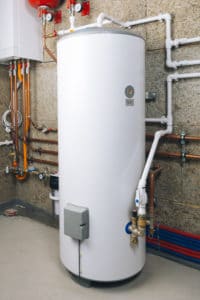Everything You Need to Know About Residential Boilers
An Important Aspect to Many Central Heating Systems

When it comes to HVAC equipment, most people can tell you what a thermostat does, or point to an air vent. Some people (especially if you read this blog!) might know what a condenser is, too. But we find many folks aren’t sure how their central heating system works, and whether they even own a residential boiler along with or instead of a furnace. Most of the time that’s perfectly fine. But if you suddenly can’t heat your home or don’t seem to have any hot water, then it becomes a problem. Here is a brief “cheat sheet” on this equipment you should know about, before there’s an issue.
What is a residential boiler?
There are two types of systems: steam boilers, which aren’t used much anymore, and hot water boilers. We’ll focus mostly on this latter kind of equipment in this post.
A residential boiler serves as a middleman between your furnace and your heating. Once the water has started to boil inside this tank, the system distributes the heat through pipe or ductwork. This boiler ensures can wash your clothes in warm water, or take a hot shower.
Boiler systems come with two types of ratings: standard and high-efficiency. As you might imagine, standard models are often cheaper, and sadly, more expensive to operate when it comes to your heating bills. In contrast, high-efficiency boilers may cost a little more, but usually qualify for significant Energy Star discounts and over time, cost less to run in your home.
Maintaining a home boiler
Like the rest of your HVAC system, it’s important to schedule an annual boiler system service inspection every year. This isn’t for show, but to troubleshoot issues that may turn into costly problems if left unchecked. Among other things, they’ll be looking for cracks or damage to the tank, water leaks, and overall boiler pressure.
Along with a service technician, you can also ensure peak performance in your boiler by checking regularly to make sure the area around it is always clear. Toys, furniture, cardboard boxes, paints or other chemicals should never be kept near this equipment. First, it’s a serious fire hazard, and secondly, you always want to have access to the gauge and the pilot light if necessary.
Benefits of a Newer Residential Boiler Unit
If you’re interested in saving energy around your home, consider upgrading to a high-efficiency boiler. You’ll get more heat at a far lower price. A new oil boiler should have at last an 80% rating, and a gas boiler an 89%-98% rating. Boilers run on electricity enjoy a 100% efficiency rating.
There’s lots of further information at energy.gov on the topic, and your Air-Tro service professionals can also help you explore your options. And now that you know what a residential boiler is, you’ll also impress lots of folks at parties, too. Trust us, that knowledge and a smile has been known to make even the most blasé guest swoon. Well, most of the time, anyway!
Have questions about how you can save energy with a high-efficiency HVAC system? Call Air-Tro, the heating and air conditioning company that has been keeping the San Gabriel Valley comfortable since 1969! (626)357-3535.
